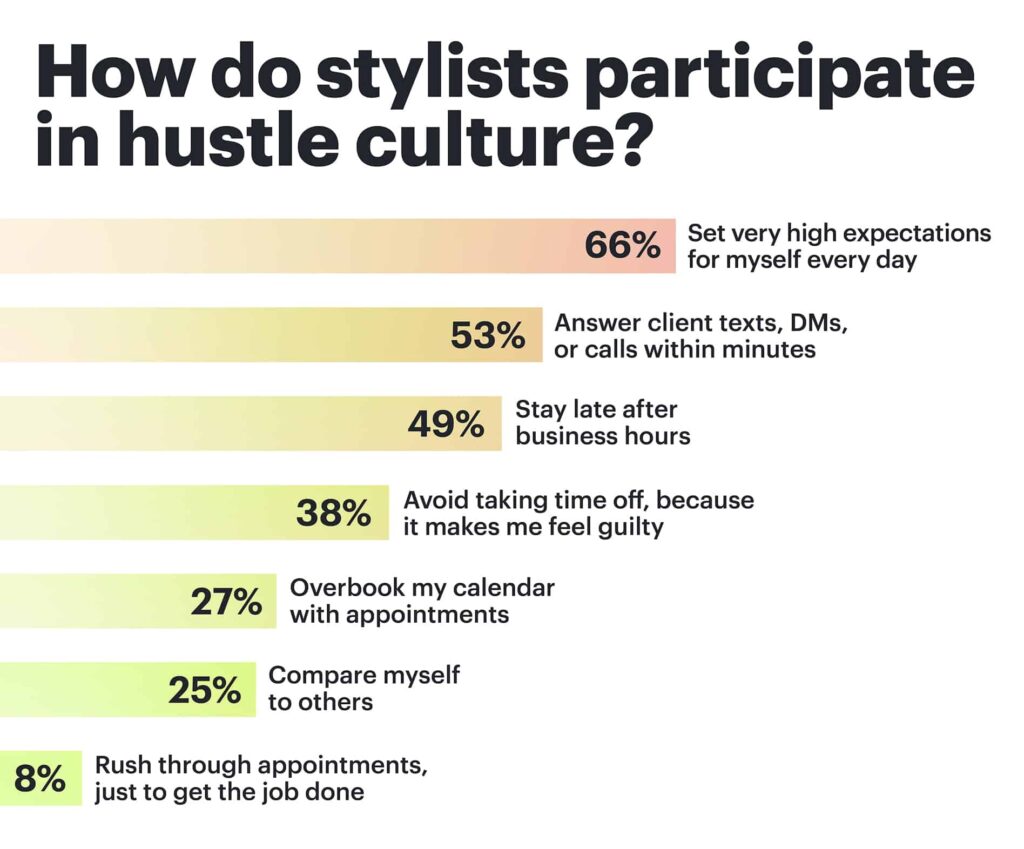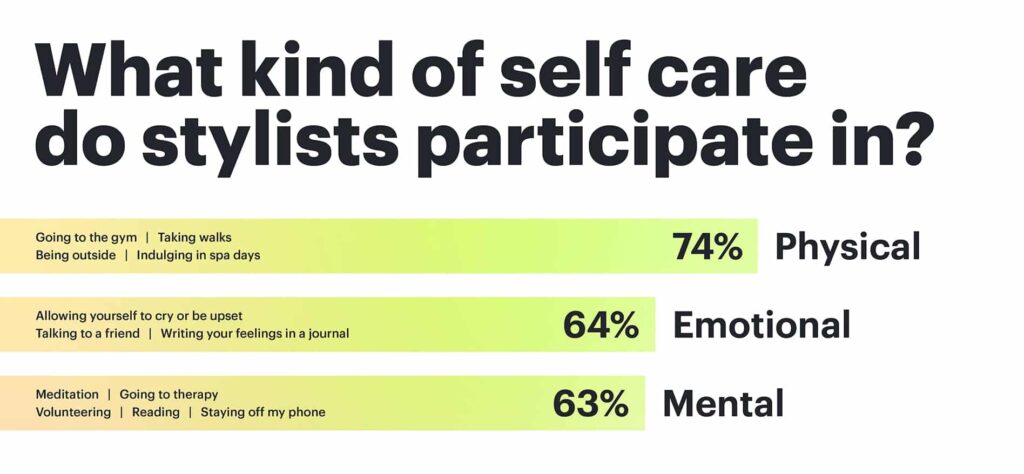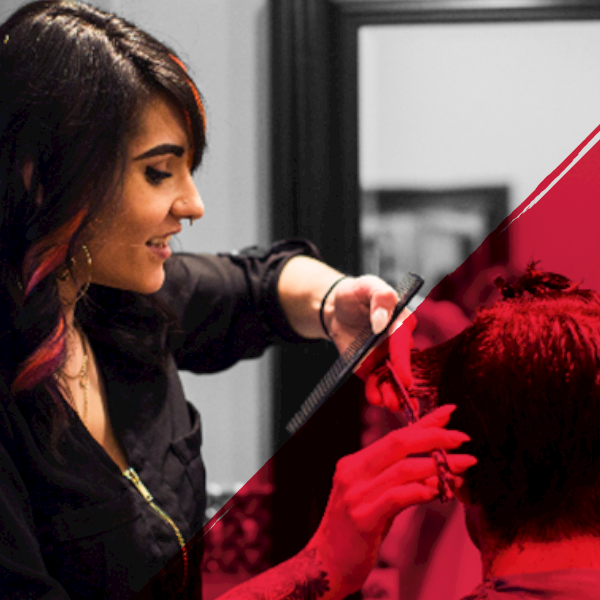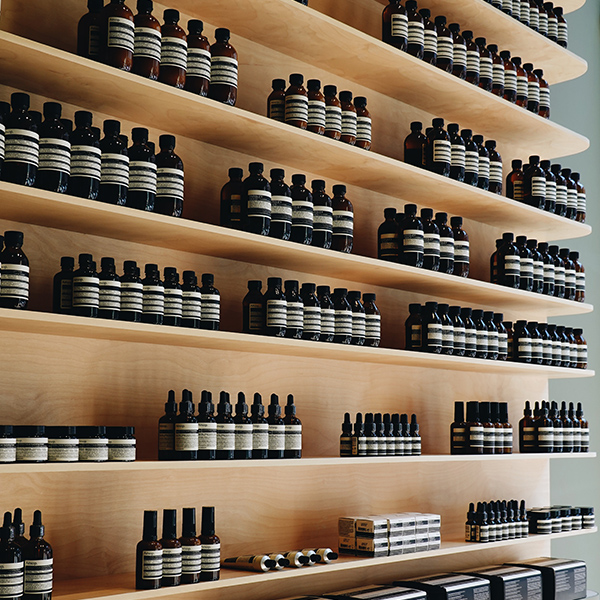The momentum of hustle culture is dying among stylists, as they prioritize work-life balance and make strategic career moves to work less.
The momentum of hustle culture is dying among stylists, as they prioritize work-life balance and make strategic career moves to work less.
“No days off.”
“Rise and grind.”
“I’m a workaholic!”
Sound familiar?
These mentalities are all part of what’s become known as hustle culture. 👇
In this blog:
• What is hustle culture?
• How hustle culture affects stylists
• How do stylists participate in hustle culture?
• Balance culture & hair stylists
What is Hustle Culture?
Hustle culture is a social workplace movement that glorifies intense productivity, ambition, and financial success.
Hustle culture is rampant on social media, glamorized by internet entrepreneurs who overwork on purpose – and then boast about it.
To them, there’s always something better:
- More money to make
- A bigger house to buy
- A better car to drive
- New clothes to show off
- A promotion to earn
- A higher ceiling to smash
These internet celebrities and influencers feed off of people’s insecurities about what they don’t have and what they’re not doing.
They preach that in order to succeed, you have to push yourself to your limits.
And when you think you’ve worked your hardest, work harder.
This is especially true in the hair industry.
How Hustle Culture Affects Stylists
In 2019, the World Health Organization classified burnout as an occupational phenomenon.
Burnout is a syndrome…resulting from chronic workplace stress that has not been successfully managed.
It is characterized by… feelings of energy depletion or exhaustion; increased mental distance from one’s job, or feelings of negativism or cynicism related to one’s job; and reduced professional efficacy.”
Putting in 12-hour days, taking on every client is very common for stylists, especially in the beginning of their careers.
Many hair professionals agree that hustling is the only way to build your business.
Some even say, the younger generation of stylists don’t hustle as hard as the older generation of hair pros. They simply don’t know how.
But.. what if they don’t want to?
See, the trouble is, when you begin your career in hustle culture and your only example of “success” is nonstop work, you don’t know any other way.
And since stylists often have decades-long careers, burnout is inevitable.
Hustle culture in the hair industry is unsustainable, but why is it still the norm?
To discover how the current industry operates under hustle culture, Schedulicity surveyed hair professionals, including independent stylists, salon owners, and booth renters.
These are the results, along with anonymous direct quotes from the survey:
Hustle culture isn’t welcome, but it continues to stay.
An overwhelming 75% of hair professionals say that hustle culture is toxic.
Most stylists, booth renters, and salon owners agreed that the all-or-nothing mentality isn’t healthy.
Ironically, the industry at-large is slow to change this narrative.
76% of survey-takers also said they feel pressured to do more, be more, or hustle more in their careers.
Acknowledgement without change is a recipe for burnout.
Stylists consistently push themselves too hard.
According to our survey, stylists perform toxic work behaviors regularly – and they know it.
The most common toxic behavior is self-sabotage.
66% of stylists say they set too-high expectations for themselves every day.
This constant internal pressure can lead to mental and emotional burnout.
Coupled with other unhealthy behaviors, like a lack of boundaries, can overwork stylists.
53% of surveyed hair professionals said they respond to clients immediately.
Stylists often answer client communication within only minutes. (We defined client communication as phone calls, text messages, emails, and direct messages on social media.)
And not only are hair professionals always mentally on, they’re likely physically in the salon too often.
49% of stylists said they regularly stay late, after business hours.
This bad habit is easy to pick up, but it blurs the line between personal and professional lives and makes work-life balance nearly impossible.

“Even if we don’t want to be a part of hustle culture, we have no choice because we have to be busy to make money.”
Hair professionals don’t prioritize self-care.
Stylists, booth renters, and salon owners take care of other people all day.
However, they don’t prioritize taking care of their own needs.
47% of survey-takers said they do not prioritize their self-care.
In fact, some professionals take it a step further: 38% of hair professionals feel guilty (!) for taking time off.
“I realized I haven’t had a 7-day vacation in 32 years. I take only two days off, coupled with a Sunday or Monday. I’m currently taking at least 5 of those [weekends] a year, but it never feels like true pleasure or rest.”
Before you ask “why,” it’s important to remember that many professionals in the hair industry don’t accrue paid time off, like office jobs.
Simply put: If they don’t work, they don’t make money.
If they don’t make money, they can’t pay their bills.
When this deep-seeded nervousness about basic financial health is exacerbated by bad internet advice about how money is the key indicator of success, stylists are thrust into a hamster wheel of work.
They’re sacrificing work-life balance, mental health, and personal relationships to reach someone else’s definition of success – someone they probably don’t even know.
“I like the idea of having the strength to be able to hustle, but people who hustle are usually really struggling and have no choice. To say [hustling] like [it’s] a good thing is toxic. It glorifies the struggle it truly is. To hustle is to be living on a financial cliff every day!”
Social media is (mostly) harmful.
Some hair professionals noted that social media is a great way to:
- Build their professional brand
- Find new clients
- Network with other professionals
However, most stylists said social media has a negative effect on their everyday reality.
53% of respondents said they do not feel good about their life after scrolling through social media.
“I feel like if I’m not constantly doing something productive, or posting on social media, then I’m not being successful.”
Stylists report physical consequences of over-productivity.
When asked for their thoughts on hustle culture, most surveyed hair professionals talked about poor mental health and a lack of personal relationships.
Many detailed physical ailments, induced by overworking, including:
- Back pain
- Exhaustion and chronic fatigue
- Panic attacks
- Body aches
- High blood pressure
- Inconsistent eating habits
- Joint pain
One survey taker explained that “working too much destroyed [their] body,” over 40+ years. It caused two shoulder surgeries, two foot surgeries, carpal tunnel surgery, and the development of scoliosis.“At age 61, [hustling] is really taking a toll on me, and my health is suffering because of it.”One survey taker explained that “working too much destroyed [their] body,” over 40+ years. It caused two shoulder surgeries, two foot surgeries, carpal tunnel surgery, and the development of scoliosis.
Another long-term hair professional said that “hustling… 12 to 14 hours a day” brought on strokes and seizures, leading to brain surgery.
“At age 61, [hustling] is really taking a toll on me, and my health is suffering because of it.”
The Future of the Hair Industry: Balance Culture
High self-standards, overbooked schedules, and unnecessary competition are a dangerous combination – ripe for toxic productivity in a salon.
Fortunately, the glamor of overworking is losing its shine.
The hair industry is beginning to have a larger conversation around work-life balance, professional boundaries, and reprioritization.
Here’s the good news:
Anxiety is less common.
54% of survey-takers said they don’t feel stressed, burnt out, or anxious at work beyond normal limits.
Disconnecting is the first step to self-care.
66% of hair professionals said they feel like they can disconnect from work, marking a long-awaited change from hustle to balance culture.
Hair professionals are taking more time off.
Step 1: Disconnect.
Step 2: Get away.
Outside of obligations, like school pick-ups and medical appointments, purposeful time outside of the salon is steadily increasing.
59% of hair professionals said they take enough scheduled time off of work.
More and more stylists and salon owners plan time away from work for vacations, weekends, and even daily lunch breaks.

“I spent my first 15 years grinding, and my body was suffering physically and mentally. I started to hate work and the path I’d chosen.
I now work solo in a studio, and I’m much more balanced and happier with what I do.
Most entry-level jobs earn more than I do, but I refuse to burn myself out anymore.”
In fact, many hair stylists are turning to technology, like booking apps, to help them manage their busy schedules and career expectations.
Here’s how getting a stylist or salon booking app can help you find balance behind and beyond the chair:
Create Boundaries with Customizable Policies
Scheduling apps, like Schedulicity, do more than book appointments.
They help stylists protect themselves, their business, and their client relationships with policies.
Policies are written boundaries that clients must acknowledge before booking an appointment.
If a client doesn’t acknowledge your policy, they can’t book with you – saving you the guilt trip or an awkward conversation.
Schedulicity’s policy feature essentially steps in-between you and a loose-cannon client, and says no for you.
You can write policies (and draw boundaries) for:
- Cancellations
- No-shows
- Late clients
- Refunds
- Deposits and prepayments
- And more!
Schedule Personal Time Off
It seems ironic to plan to do nothing, but what gets scheduled… gets accomplished.
Taking time off for you should not make you feel guilty.
Treat time off like an appointment, an appointment for you.
More and more stylists are using booking apps that allow them to block personal time off on their calendars.

They’re becoming temporarily unbookable – and truly taking a break.
And it’s going beyond the makeshift Sunday-to-Monday “weekend.”
Stylists are taking daily breaks from the salon for lunch or an afternoon walk, and they’re finally booking vacations.
An expert balance culture tip? Leave your phone at your station during your break. Enjoy tech-free time away to reset.
Automate Client Communication
Hair stylists often feel obligated to respond to client needs immediately.
They fear that a lack of constant communication seems like bad service. If their client picks up on it, they’ll walk away.
It’s a vicious cycle, but fortunately, there’s a solution: Automating client communication.
Most clients message you about their appointment:
- Rescheduling
- Cancellations
- Confirmations
- Reminders
- Running late
Booking apps, like Schedulicity, have automatic appointment reminders and confirmations via text and email, so you don’t even have to look at your phone.
Clients get a text with appointment details and respond CONFIRM. Schedulicity adjusts your calendar without the back-and-forth.

These self-sufficient booking apps also give clients the ability to cancel or reschedule their appointment on their own.
Schedulicity even notifies you of the change and adjusts your calendar – either moving or deleting the appointment – without double-booking.
“Hustle culture definitely makes you more money, but then, you just spend it trying to be happy. If you work less, you don’t need the money to be happy!”
Avoid Overbooking
Half of stylists say they work beyond regular business hours.
This overtime goes beyond bookkeeping and back-room inventory.
27% of stylists regularly overbook their calendar with appointments.
That means, most hair stylists are taking on too many clients and pushing 10- to 12-hour workdays every week.
Scheduling apps are literally made to help you keep your calendar in control.
Your calendar should not control you.
With Schedulicity, you can set your business hours as soon as you sign up.
Because clients book themselves online, they’ll never be able to book an appointment outside of the business hours you set.
This gives you an immediate boundary and avoids overbooking you.
An expert balance culture tip? With Schedulicity, you can add clean-up time after each appointment. It only takes 10 to 15 minutes to help you reset and avoid rushing from one client to the next.

Ask for Help
The golden rule of balance culture that transcends industries and titles:
Ask for help.
Ask your co-workers or employees for help.
Ask your family and friends for support.
Ask us.
We’re more than just a booking app. Schedulicity truly cares about the health and wellbeing of all our businesses and the industry as a whole.
If you’re feeling overwhelmed, burnt out, stressed, or anxious, here’s a list of resources and open helplines to contact:
- Mental Health America
- National Institute of Mental Health
- Anxiety and Depression Association of America
- Mental Health First Aid
- PsychoHairapy: A Global Mental Health Movement for Hair
Citation: Jacobson, K. (2024, March 6). 2024 report: Hustle Culture in the hair industry. Schedulicity. https://www.schedulicity.com/essentials/blog/hustle-culture-in-the-hair-industry/



